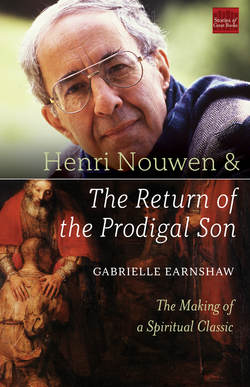Читать книгу Henri Nouwen and The Return of the Prodigal Son - Gabrielle Earnshaw - Страница 8
На сайте Литреса книга снята с продажи.
Chapter 1 The Collapse, November 1983
ОглавлениеIn the hero stories, the call to go on a journey takes the form of a loss, an error, a wound, an unexplainable longing, or a sense of a mission. When any of these happens to us, we are being summoned to make a transition. It will always mean leaving something behind.… The paradox here is that loss is a path to gain.
—David Richo1
Nouwen walked into Simone Landrien’s office and saw the Rembrandt poster for the first time. Feeling lost and exhausted, he found the image of the father blessing his son touched a place inside him that had “never been reached before” (Prodigal Son, 4). What led to this moment of collapse in front of the prodigal son poster and made Nouwen feel “like a vulnerable little child who wanted to crawl onto its mother’s lap and cry” (Prodigal Son, 4)? What made his heart “leap” when he saw it (Prodigal Son, 4)?
From a very early age, Henri Nouwen was on a quest. What he was searching for and how he went about finding it varied and took many forms as he grew up. But, fundamentally, Nouwen was searching for intimacy. He searched for bonds of love that would satisfy his need for safety and belonging.
By all accounts, Nouwen came from a loving, stable family, but in his words, “Somehow fear of being rejected, of being abandoned, of being disliked has been with me as long as I can remember. I kept asking my parents, friends and colleagues in many different ways: ‘Do you love me?’ And I never heard a clear Yes that I could receive. I kept doubting, wondering, searching and begging for a final clear and total Yes, but it never seemed to come.”2
“Do you love me?” was his primal cry for love and affection. It was a reaching-out for affirmation that perplexed his parents, Maria and Laurent. This yearning for love, what he calls “special love” (Home Tonight, xvii), is one of Nouwen’s signature character traits. Many of his life decisions make sense in view of this dominant feature of his personality.
The search for love imbued Nouwen with curiosity and a sense of adventure as well as restlessness and dissatisfaction. It led him to join the priesthood and to a lifelong love affair with God. It also led to dark nights of the soul when loneliness and depression overwhelmed him.
His first book, Intimacy, published in 1969 when he was thirty-seven years old, explored this foundational quest. In Intimacy, the search for love is equated with the search for home. In the Introduction, Nouwen says he will address “the seldom articulated and often unrecognized desire for a real home in this world” (Intimacy, 2).
The word home conjures up images of safety, rest, and familial bonds. Home, if we are fortunate, is often a place of unity, integration, and freedom. These are the objects of Nouwen’s quest—as a baby in the crib reaching out for his parents, in 1969 as a young scholar writing his first book, in 1983 when he sees the Rembrandt poster for the first time. Nouwen is on a quest for home. The painting hits him “like a bolt of lightning” (as he describes it in an early draft of the manuscript—the Turner accession) because here, in the magical light of Rembrandt’s painting, he finally catches a glimpse of it.
The Return of the Prodigal Son has many characteristics of a spiritualquest narrative. Like all hero or heroine stories, Nouwen begins with a classic opener: “One day I went to visit my friend …” He describes his state of mind: “I was exhausted from a self-exposing speaking tour.” He creates an instant rapport with his listeners by sharing his vulnerability: “I was anxious, lonely, restless, and very needy.” When describing the feeling of seeing the poster for the first time, he uses a biblical quote, “My heart leapt when I saw it,” referencing the passage in Luke when Elizabeth hears Mary’s greeting and her baby “leaped in her womb.” As in Luke’s Gospel, this detail foreshadows a spiritual event to come. It has a suggestive quality of larger mysteries to unfold. The pregnancy imagery hints at a rebirth.
He draws us deeper into his story by describing a series of trials—his breakdown after moving to L’Arche following the dissolution of an important relationship, the accident that left him close to death, reconciliation with his father that called him to a new vocation of blessing and forgiveness.
While Nouwen travels a far physical distance in his journey, the tale he tells in The Return of the Prodigal Son is ultimately an interior one. Like heroes or heroines in myths and fairy tales, Nouwen gains wisdom from his trials and is transformed. He moves from seeker to the one found. He has new ears to hear the answer to his lifelong search for love and it fills his soul—“You are my Son, the Beloved; with you I am well pleased” (Mark 1:11). Finally, like heroes or heroines before him, he goes on to share these “pearls of great price” with us, and with the story told we are left to ponder how we will navigate our own quest.
